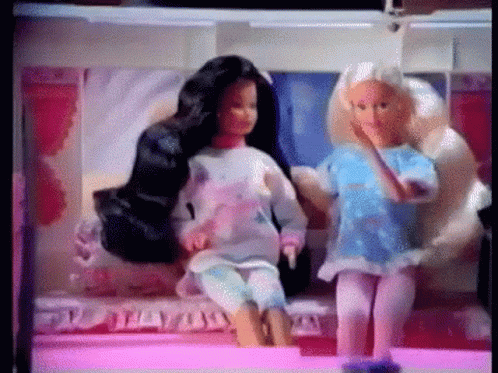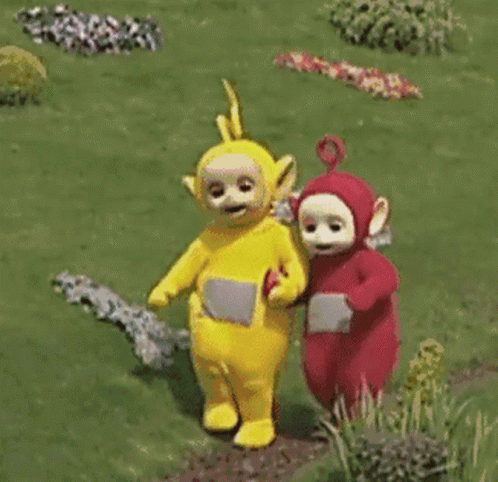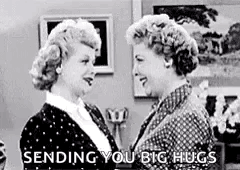👯The Importance of Community in Podcast Marketing
We literally call them "Podcast Friends" on purpose
Hi all!
I’ve been thinking a lot recently about the enduring power of #AudioDramaSunday. For folks outside of the fiction sphere, this tag is basically what it sounds like: on socials, everyone — but especially creators — post about audio dramas they love. It isn’t for self promotion; it’s for hyping up the medium as a whole, giving praise where it’s definitely due, and for making new friends and connections with your colleagues. I wrote about it back when I was working for Apollo, and even in these quasi-post-Twitter days, the tag has shockingly remained a core part of the fiction world. There’s even a fantastic audio drama newsletter from friend of Tink Bob Raymonda that comes out on #AudioDramaSunday each week!
But I think nonfiction podcasters deserve to have fun, nice friends, and easier/better/happier/nicer/excitinger marketing opportunities too! Let’s get down to philosophies on why community engagement is more important in podcast marketing than ever — and how to engage with that community.
🛑BUT FIRST: Let us define community
For the purposes of this newsletter edition, when I say your “community,” I mean colleagues in your sphere of podcasting. That sphere could be all different sizes: the entire (huge!) medium of fiction podcasts is usually discussed as one community, but for your show, think something like “comedy podcasts by Black women based in Houston” or “radio-affiliated science podcasts.” What that community looks like to each person is going to be radically different — just know I’m not talking about fostering community with your audience right now. I’m talking the people who are creating alongside you.
💖Why #1: That’s your podcast friends!
At Tink, you know we’re always talking about podcast friends, the term we use for co-marketing partners (e.g. another podcaster with whom you’re coordinating a promo swap). But we don’t use the term “friend” lightly.
If you’re taking the time to reach out to a podcast you really enjoy to coordinate a promo swap, that can be a lasting connection. Not all of these marketing partners are going to hit on a potential friendship level, but way more of them can than you might realize. Aren’t we, societally, always talking about how hard it is to make friends as an adult? This is a way to make friends as an adult. You already like their podcast, and you’re already talking.
And of course, the more folks you start talking to, the more genuine connections you make, the more your overall sphere of community will grow and solidify its bonds. At its core, networking is just about making friends — and the most authentic, collaborative friendships means you can all work with each other, talk each other up, and hype up each others’ shows so much easier.
🫣Why #2: Avoiding PR disasters
So sometimes something in the audio industry happens, and if you’re like me and have Can’t Shut Up disease (terminal), you will want to huff and puff about it real bad. Because making a podcast so often feels like creating into the void, a faceless cloud of listeners, it can feel compelling to huff and puff into the void as well: on socials, on the podcast itself, etc.
This can very easily become a PR disaster. Let’s get real: things might feel especially, hmmmm, volatile right now. Perhaps there are things occurring in the world that make you feel more anxious, more irritable. Sharing community in a real way with likeminded creators who understand the ups and downs of the industry (as in, the business side of podcasting versus the human side of podcasting) can save you from what might otherwise be a marketing nightmare. Never, ever post a take on main or discuss on your podcast without talking to your community about their thoughts on the news first.
I am telling you that gossip may just save your marketing altogether. Please gossip with your friends so you don’t even have to hit the notes app apology stage.
💵Why #3: Checking rates
Speaking of gossip: if you are ever going to look into an ad marketplace or pursue paid advertising about your show, keeping community is a vital way to cross-reference rates. Unless someone has me sign an NDA, I am all about freely sharing rates of what I paid and what I’m getting paid for just about everything in the industry. So many times, I’ve shared rates I’ve been paid only to find that a colleague is being absolutely lowballed. Other times, I might share that we had great success on placing a paid ad somewhere that currently has fantastic rates.
Podcast marketing doesn’t have to be a black box of mystery information that you’re not allowed to access. Community allows you to check current rates on ads and more — and band together to make sure everyone is being paid, or charged, fairly.
📱How #1: Bear with me here — socials
Socials are a mess right now, and followers on socials do not significantly convert to listeners. We’re big on saying that putting your marketing resources (including time and emotion) into social media is a waste, especially right now.
But: socials can still be a great way to meet other creators, not new listeners. It just has to be done well. Join a Discord server with other podcast creators. Find starter packs of podcasters on Bluesky. Reblog from podcasters on Tumblr. But most importantly: no matter where you spend your time, make sure you’re spending it getting to know your community. Seeing a podcaster’s personality on socials is a great way to make sure they’re someone you actually might get along with.
Don’t go in expecting an immediate friendship, of course — but use social media as a first step towards learning about who your community even is so you can start connecting more directly.
💌How #2: Send an email
So many of my connections in podcasting have been made by me emailing a podcaster to say I like their work. Like I said before, podcasting can feel like you’re creating in a void. Nobody hates receiving messages of appreciation and support — or, like, nobody you should want to be podcast friends with, at least.
Because I’m always thinking of the audio community and industry, I’m also always eager to ask the opinions of creators I admire. This also helps turn a single email into an actual potential conversation. I’m never pitching anything in these emails, but instead, I’m trying to learn and ask people’s opinions. An email like this will likely more or less go:
Hey, [podcaster]!
I was listening to [podcast] lately and I just really wanted to reach out and let you know how much I love the work you’re doing. [Talk about how great that work is!]
I’m a podcaster as well, and I admire your show so much. I saw recently that [something in the industry news] and I’d love to know your thoughts. If you’re ever interested, I’d love to talk shop! Either way, thanks so much for your time.
Ask questions you genuinely want answers for, and ask the people whose answers you would genuinely appreciate. Make the first friendship move, and make it clear that you are showing up with respect and gratitude up front.
📆How #3: Make it consistent
Turning an email into actual community seems harder than it actually is. The key is consistency. One of the best things I’ve done for my creator morale recently is set up a recurring monthly Zoom hangout of folks in my community, and we always take time to ask what everyone’s working on and how we can help market each other. We’ll set up promo swaps and help each other brainstorm who else they can work with right there in the hangout.
Check in with people. Ask how they’re doing. Congratulate them on wins and hype up their new work. Foster the friendships you want. Model the kinds of relationships you want to get back. Be kind and be real, and you’ll find the same coming back to you.
And if you don’t, well . . . at least you’ll have some solid friends to gossip with about it. 😉
✨ More Magic
Our Radio Boot Camp sessions on podcast marketing last week were AMAZING! Thank you so much to everyone who joined in! If you weren’t able to make it and you’re bummed you missed out, let us know in the comments . . . for reasons😉. And if you want a one-on-one podcast marketing bootcamp from Tink, customized for your podcast, your goals, and your hurdles, check out our Podcast Therapy sessions! We’ve always got openings in our schedules to talk to you about your show.
🎧 From the Desk of Tink
Mondays take up 1/7th of your life. Why be so Garfield about it? In Never Miss a Monday, Stacey Garcia — a mom, personal trainer, Reiki Master Practitioner, integrative health coach, and breast cancer survivor — is all about cherishing the opportunities in life. Garcia discusses holistic practices, mind and body connection, and facing adversity with her fascinating guests. And, of course, discussion often comes right back to what we need so much right now: community.
Go make friends! Next week, Shreya returns with some more podcast marketing magic. ✨
— Wil 🦇









Really good and practical advice. I think it's wise to consider social media as a way to connect colleague to colleague and less about the hope of reaching listeners.
I have been missing my podcast community for sooooo long. Hoping I can find a little here. 🤗